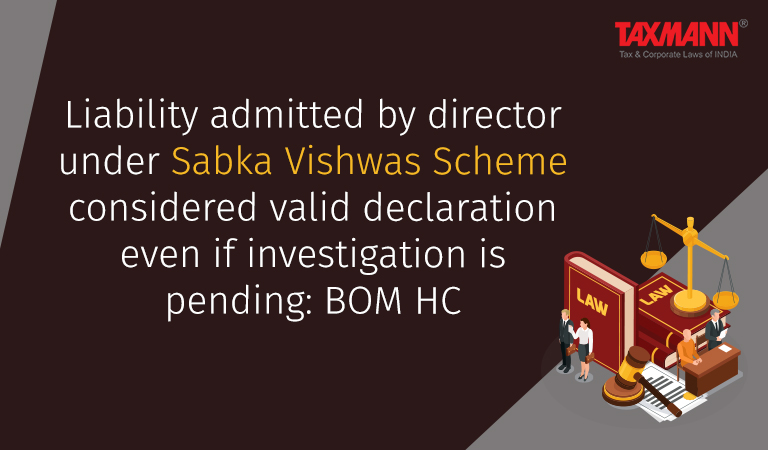Liability admitted by director under Sabka Vishwas Scheme considered valid declaration even if investigation is pending: BOM HC
- Blog|News|GST & Customs|
- 3 Min Read
- By Taxmann
- |
- Last Updated on 11 February, 2022

Case Details: Nabeel Construction (P.) Ltd. v. Union of India - [2022] 134 taxmann.com 335 (Bombay)
Judiciary and Counsel Details
-
- R.D. Dhanuka and S.M. Modak, JJ.
- Abhishek A. Rastogi and Pratyushprava Saha, Ms. Kanika Sharma, Ms. Khaitan for the Petitioner.
- Pradeep S. Jetly, Sr. Adv. and Jitendra B. Mishra for the Respondent.
Facts of the Case
The petitioner is engaged in providing construction services of commercial or industrial buildings and civil structures. An inquiry for investigation was conducted by DGGI. The Director of the petitioner submitted a statement before the DGGI and admitted a service tax liability of Rs. 1.28 Crores. A part of this liability i.e. Rs. 1.26 Crores was confirmed in the show cause notice. With respect to this liability, the petitioner deposited an amount of Rs. 90 lakhs.
In the meantime, the Government launched the Sabka Vishwas (Legacy Dispute Resolution) Scheme, 2019 with respect to which the petitioner filed the Declaration in Form SVLDRS-1. The petitioner declared the tax liability of Rs. 1.28 Crores under the Scheme, computed the amount payable as Rs. 64 lakhs (i.e. 50% of the ‘tax dues’) and adjusted the deposit amount of Rs. 90 Lakhs. The net liability after such adjusted was computed as zero.
Notably, Section 125 of the Scheme provides that the person would not be eligible to claim the benefit of the scheme where the amount of duty involved in the enquiry or investigation has not been ‘quantified’ on or before the 30th day of June, 2019. On this basis, the department passed an order and rejected the declaration submitted by the applicant without giving an opportunity of being heard.
High Court Held
The Bombay High Court held that the tax dues as admitted by the Director in the statement on or before 30-6-2019 would satisfy the term ‘quantified’ under the Sabka Vishwas Scheme and any amount payable which has been quantified before the cut-off date, where an enquiry or investigation is pending, falls within the term ‘tax dues’. It was observed that the scheme requires the admission of tax liability by the declarant during investigation or enquiry and the figures on admission need not be exactly the same as quantified by the department. The High Court directed the department to consider declaration as valid.
Further, the Bombay High Court quashed the order due to non-compliance of principles of natural as the opportunity of being heard was not given to the petitioner.
List of Cases Referred to
-
- Saksham Facility Services (P.) Ltd. v. Union of India [2020] 122 taxmann.com 109 (Bom.) (para 13)
- Viztar International (P.) Ltd. v. Union of India, [2021] 47 GSTL 341 (Bom.) (para 13)
- G. R. Palle Electricals v. Union of India [Writ Petition (Stamp) No. 3485 of 2020, dated 26-11-2020] (para 13)
- Metro Developers v. Union of India 2021 SCC Online (Bom.) 6061 (para 13)
- RS HR Team Solutions (P.) Ltd. v. Union of India 2021 SCC Online (Bom.) 234 (para 13)
- Jai Sai Ram Mech & Tech India (P.) Ltd. v. Union of India [2021] 47 GSTL 244 (Bom.) (para 13)
- Sabareesh Pallikere v. Jurisdictional Designated Committee [2021] 125 taxmann.com 361 (Bom.) (para 13)
- Suyog Telematics Ltd. v. Union of India, [2021] 47 GSTL 346 (Bom.) (para 13)
- Eminence Container Lines v. Union of India [Writ Petition (L) No. 4994 of 2020, dated 25-2-2021] (para 13)
- JSW Steel Ltd. v. Union of India 2021 SCC Online 3584 (para 13)
- JSW Steel Ltd. v. Union of India [Writ Petition No. 970 of 2020, dated 21-10-2021] (para 14)
- Thought Blurb v. Union of India [2021] 123 taxmann.com 316 (Bom.) (para 15)
- Capgemini Technology Services Ltd. v. Union of India [2020] 121 taxmann.com 107 (Bom.) (para 63)
- Vaishali Sharma v. Union of India [2020] 122 taxmann.com 300 (Delhi) (para 64)
Click Here To Read The Full Notification
Check out Budget Marathon | Taxmann's one-of-a-kind Webinar for the Union Budget 2022-23
Disclaimer: The content/information published on the website is only for general information of the user and shall not be construed as legal advice. While the Taxmann has exercised reasonable efforts to ensure the veracity of information/content published, Taxmann shall be under no liability in any manner whatsoever for incorrect information, if any.

Taxmann Publications has a dedicated in-house Research & Editorial Team. This team consists of a team of Chartered Accountants, Company Secretaries, and Lawyers. This team works under the guidance and supervision of editor-in-chief Mr Rakesh Bhargava.
The Research and Editorial Team is responsible for developing reliable and accurate content for the readers. The team follows the six-sigma approach to achieve the benchmark of zero error in its publications and research platforms. The team ensures that the following publication guidelines are thoroughly followed while developing the content:
- The statutory material is obtained only from the authorized and reliable sources
- All the latest developments in the judicial and legislative fields are covered
- Prepare the analytical write-ups on current, controversial, and important issues to help the readers to understand the concept and its implications
- Every content published by Taxmann is complete, accurate and lucid
- All evidence-based statements are supported with proper reference to Section, Circular No., Notification No. or citations
- The golden rules of grammar, style and consistency are thoroughly followed
- Font and size that’s easy to read and remain consistent across all imprint and digital publications are applied



 CA | CS | CMA
CA | CS | CMA
